Her mother, Yamile Perez, glanced over at her daughter to make sure all was well as she attended a virtual meeting with Chicago Public Schools officials who were evaluating Keinymar’s needs. It is not easy to let someone else hold your child, especially if your child requires special medical care.
No one knows this better than the person cradling the girl, Mary Otts-Rubenstein, a Chicago resident who has her own child with disabilities. Otts-Rubenstein has taken it upon herself to help over a dozen migrant families with medically complex kids enroll in CPS.
The children range in age from 7 to 13. Some are in wheelchairs and have conditions such as autism, cerebral palsy and Down syndrome. Few have ever been enrolled in school before; all survived journeys crossing jungles and rivers to reach the United States.
Otts-Rubenstein has been leading volunteer efforts for these children for over two months, stepping in where city officials have failed to identify and provide acceptable solutions for disabled migrants. She got involved after another volunteer who is helping migrants called her, knowing her expertise.
Any family with a child who has disabilities faces unique challenges. But what has been so hard for these families in particular, said Otts-Rubenstein, who doesn’t speak Spanish and has personal experience navigating the complex public school system, is having nowhere to turn for help.
“As a family with a disabled kid, the only people who know what we’re going through are other families with disabled kids,” she said.
Experts say children with severe disabilities born in the United States are already at a disadvantage in accessing a quality education, but migrant families with disabled children face especially daunting hurdles.
“As (migrant) families come to Chicago, we know they are struggling to find housing, employment and health care. This process becomes especially hard for families with children with disabilities,” said Michelle Garcia, manager of organizing and community development at the nonprofit Access Living.
CPS reports that 16 percent of its 323,000-student population has an individualized education plan, which lays out the special education services and instruction a student may need to attend school. CPS has a specific office to identify and serve diverse learners, making sure all schools have appropriate accommodations and all students have safe transportation options. Different schools around the city offer varying degrees of accommodations.
On the 20th day of school this year, CPS had 51,910 diverse learners, 2,563 more than last year. The district has over 5,000 special education teachers — the most of any point in recent years, according to a district spokesperson. But Otts-Rubenstein, who went through the process of enrolling her own daughter in Chicago Public Schools, said the system is overwhelmed.
On a recent Saturday morning, she opened her Lakeview neighborhood apartment to several migrant families staying at the Inn of Chicago so they could have a safe place to conduct individual assessment meetings with staff members from Chicago Public Schools. Migrants spent hours on borrowed iPads and computers, and were asked questions about their children’s needs they had never been asked by medical professionals.
Without Otts-Rubenstein’s help, the assessment — a long and exhausting bureaucratic hurdle — would have likely taken months.
The migrant families took public transportation to get to her home and lifted their children — many in wheelchairs procured by Otts-Rubenstein — up over the steps and through the double doors inside.
Keinymar, who Otts-Rubenstein met at a police station over a month ago, was the first child brought in.
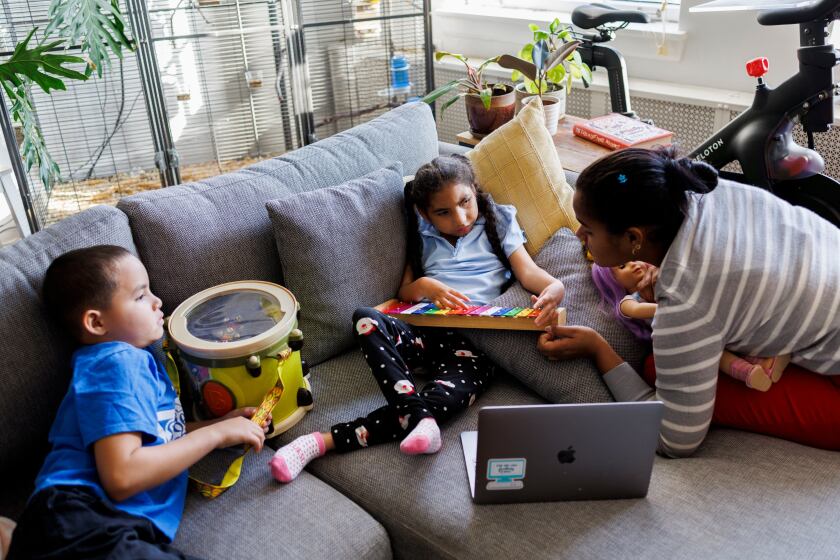
(Armando L. Sanchez/Chicago Tribune/TNS)
Keinymar
Seven-year-old Keinymar is not weak but small, and her limbs bend outward.
She weighed less than 20 pounds when, held tightly by her mother, she crossed the border to the United States in August.
Keinymar was born with microcephaly as a result of the Zika virus — a condition where a baby’s head is smaller than normal. Because of this, she also has seizures, developmental delays and intellectual disability.
The family left Venezuela for Colombia because she needed to have a major surgery to implant a feeding tube in her stomach.
“We spent three years (in Columbia) waiting for her operation and nothing. Still nothing,” said her father, Keinar Chacin.
They walked through seven countries, slept on the street and sold lollipops on corners on the way to make enough money to get here. Three days being carried through the mountains of the Darién Gap and weeks walking across country borders left the little girl barely responsive.
“Gracias a Dios, mi niña fue muy fuerte en esa selva porque no cualquiera podía sobrevivir. Thank God, my daughter was strong in that jungle, because not everyone could survive,” her mother said.
They crossed the border and took a bus to Houston, where a children’s hospital gave her a feeding tube and nursed her back to a healthy weight. With help from the hospital, the family took a bus to Chicago because the father’s brother was here, staying in a shelter.
After they were dropped off by the city at the Near North District (18th) police station in the River North neighborhood, a volunteer found Keinymar lying on the ground. She called Otts-Rubenstein, a fellow volunteer who she knew had expertise helping children with disabilities.
Otts-Rubenstein arrived with extra medical equipment in her car, but was worried about being able to have a conversation in Spanish about health care needs with the family.
But when she saw Keinymar lying on a yoga mat next to her family, her instincts kicked in. She immediately got on the floor with the little girl. Gently, she checked the hole in Keinymar’s stomach and showed her mother how to use the pump she had brought to feed her.
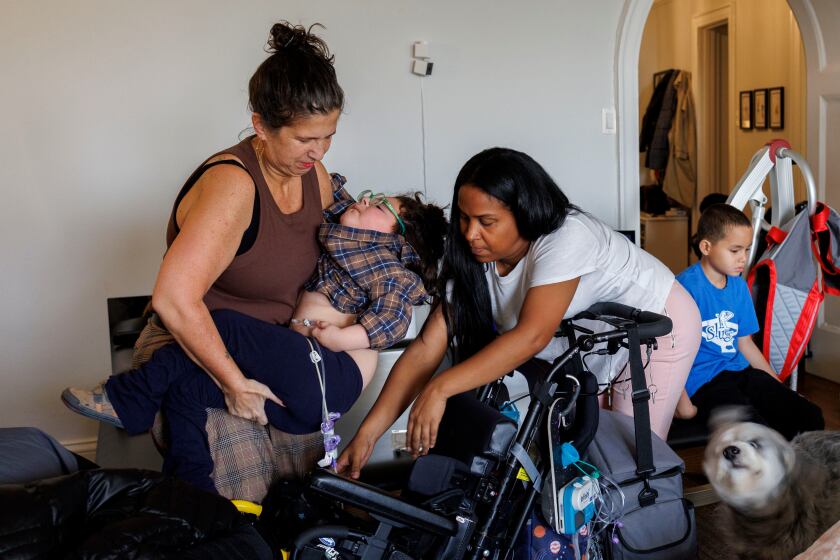
(Armando L. Sanchez/Chicago Tribune/TNS)
‘Whatever We Can Do Along the Way to Help’
Otts-Rubenstein is the full-time caretaker for her daughter, Evelyn Rubenstein.
Evelyn, or “Ev,” is medically complex and disabled, and struggles with many of the same health issues the children of some migrant families do: Cerebral palsy. Seizures. Mobility. Temperature regulation.
Otts-Rubenstein and her wife, Rachel Rubenstein, adopted Evelyn from a different foster couple. The foster dad in that couple shook her when she was just a few weeks old. She never recovered, said Otts-Rubenstein.
“Ev is a happy, silly kid with disabilities, who makes us proud and makes us laugh every single day, but the access and management of her care is a daily fight with health care institutions, schools and society at large,” she said. “And we have the privilege of being white, educated and English-speaking. Something none of these folks have.”
On Otts-Rubenstein’s left bicep is a tattoo of the first sugya or portion of the Talmud — an ancient Jewish text — she ever learned. It reminds her that an essential quality of leadership is demonstrating how to make the impossible possible with just what is in front of us, she said.
She converted to Judaism in her mid-20s, and stepped away from her job as a project manager to respond to her daughter’s needs.
“I can’t do a lot of things, but I can do this,” she said.
She says the same about the over two dozen migrant families with medically complex children she helps out on a weekly — and often daily — basis.
“Whatever we can do along the way to help them get to the next step is what we’re supposed to do,” she said.
The goal when taking care of any medically complex child, Otts-Rubenstein said, is to make sure that your child is alive at the end of the day.
“They’ve done that alone, basically walking across a continent, and have kept their kids safe,” she said. “These families should not have made it. And they did.”
That, she said, is a miracle.
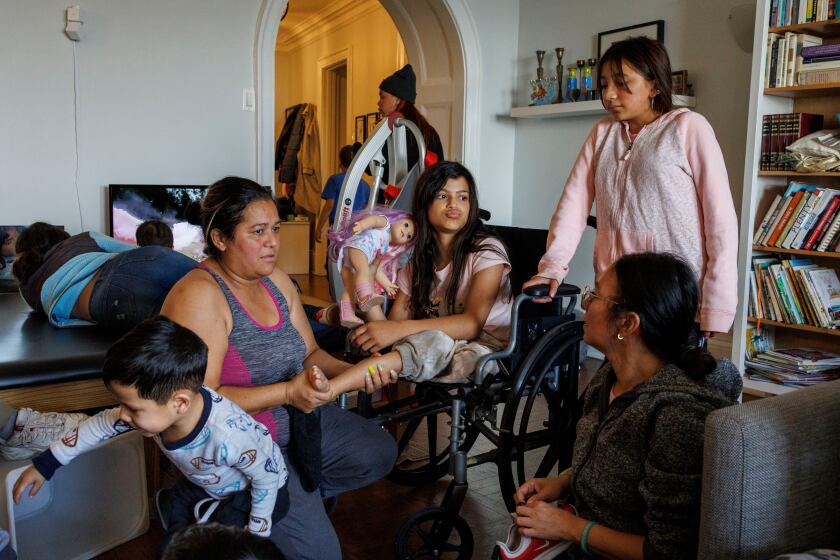
(Armando L. Sanchez/Chicago Tribune/TNS)
The Families
After meeting Keinymar at the police station, Otts-Rubenstein called city officials and learned that the city houses most migrant families with complex medical needs at the Inn of Chicago in the Streeterville neighborhood. The shelter has hundreds of individual hotel rooms and more privacy.
The city’s Office of Emergency Management had placed Keinymar’s family in a different city shelter, but Otts-Rubenstein successfully advocated for them to be transported to the Inn of Chicago.
She figured families like Keinymar’s didn’t have networks of social support.
“These are really strong, really intelligent, really self-sufficient folks,” Otts-Rubenstein said. “But none of them knew each other.”
At the Inn of Chicago, she introduced them to each other and helped them get wheelchairs from different charity groups. Before she stepped in, almost no one from the city had set aside time or resources to respond to their special needs.
Otts-Rubenstein has become like a madrina or godmother to the kids. She picks up on their particularities and nuances, and they notice that. It’s engendered their trust in her.
Evander Osorio, 30, has a 7-year-old son named Davier with spina bifida, scoliosis and cerebral palsy. Davier likes to eat yogurt and blow kisses.
The two came to the United States without Davier’s mother.
“The separation was so hard. Especially at the beginning,” Osorio said in Spanish.
Otts-Rubenstein was the only person who stepped up to help when they got to Chicago in October.
“We are so thankful for Mary,” Osorio said. “She’s our guardian angel. The only person who’s held out her hand to us.”
Juan Pablo, a 12-year-old with autism and a love of Mickey Mouse, left Venezuela with his parents to get medical care.
Without being enrolled in school, he spends most of his time in their small isolated hotel room at the inn, watching shows on their phone. He has no toys and no one outside their family is allowed in the room.
His lunches consist of pizza the family buys from the 7-Eleven across the street, which he eats outside on a towel on the concrete.
“These kids have a lot of energy. To put them in a tiny room all day is an injustice,” his mom, Yasmira Salcedy, 36, said in Spanish. “Pero siempre anda con una sonrisa. But he always walks with a smile.”
At Otts-Rubenstein’s house that Saturday morning, when she invited the migrant families over, Juan Pablo didn’t stop moving, as he bounced from Otts-Rubenstein’s couch to window to kitchen. He salivates a lot, and will usually spit it out anywhere and everywhere. Otts-Rubenstein watched him attentively, putting a Styrofoam cup under his mouth to catch it.
Otts-Rubenstein has relationships with all the kids, but is especially gentle with Keinymar, supporting her torso carefully and gently pushing her chin back so her head won’t fall forward.
“How come you have so many bubbles in your tummy?” she asked Keinymar as she set her down on the couch with her 8-year-old brother, Keinar Chacin.
That morning, Keinymar’s brother didn’t leave her side. He never leaves her side, said their mother. They curled up on Otts-Rubenstein’s couch together, him laying his hand across her collarbone while she looked up at the ceiling.
His sister can’t walk by herself, stand up or lie flat on her back. She is tube-fed and unable to feed herself. She has mobility just in her right hand, and makes sucking sounds for hunger and thirst. She is able to recognize and smile at familiar people.
She looked at her older brother as he grabbed her hair and interlaced his fingers with her on her bad hand.
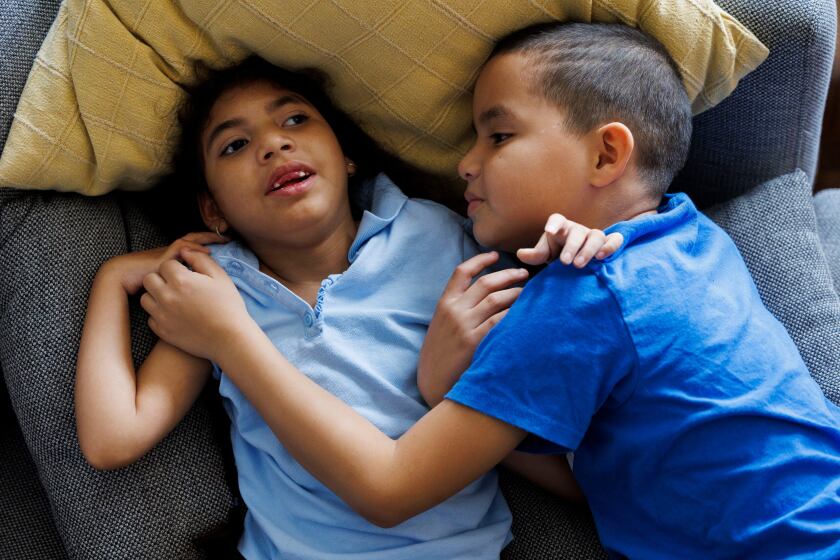
(Armando L. Sanchez/Chicago Tribune/TNS)
Individualized Education Plans
Otts-Rubenstein knew from her own experience with Evelyn that if she wanted to register the kids in school she would need to schedule individualized education plan evaluations for the migrant families.
IEPs ensure that every student has what they need in order to be able to be successful in learning. According to disability experts, establishing one for each student takes a great deal of care and attention.
Otts-Rubenstein was told the process for the kids would likely take months.
“On a good day, the district struggles with responding to neurotypical, developmentally delayed children. Everyone is drowning,” Otts-Rubenstein said.
After submitting a request with CPS and waiting weeks with little to no update on when the migrants’ plans would move forward, Otts-Rubenstein decided to schedule her own evaluations. She was told by city employees that the meetings couldn’t happen at a city-run shelter, so she arranged for them to take place in her wife’s office at Two Prudential Plaza in the Loop.
When Otts-Rubenstein asked city officials to foot the bill for transportation, they refused. Migrants pushing wheelchairs had to walk almost a mile. Temperatures were freezing that day.
The school district finally moved forward with the families’ conferences after Otts-Rubenstein presented them with the documentation she had gathered from outside therapists and medical professionals, she said.
Hannah Kaplan, youth education coordinator at the resettlement organization RefugeeOne, said the refugee families she works with often have no idea what an IEP is. She called the process “intimidating” and “inaccessible.”
“A lot of the clinicians have to present their findings in really formal language,” she said.
Language barriers and other obstacles can extend the already lengthy process.
“The Office of Diverse Learner Supports and Services works with school staff and families to identify and serve diverse learners. ODLSS conducts student evaluations and creates and monitors Individualized Education Programs to serve children who need special education services,” said a CPS spokesperson in a statement.
CPS coordinates with the city to send out mobile units to enroll students at police districts, shelters and airports. The CPS Welcome Center is also open every weekday for student enrollment, by appointment.
But Otts-Rubenstein said migrants — especially the families with children with disabilities — don’t know about the center and wouldn’t be able to arrange transportation there if they did.
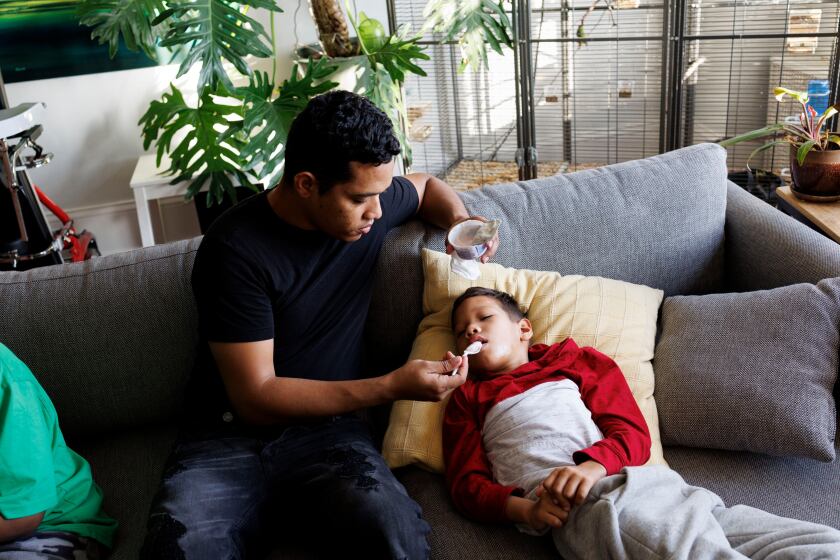
(Armando L. Sanchez/Chicago Tribune/TNS)
Perez’s Conference Call
“We want all these details to make sure people can take care of her,” said a representative from the school district over Zoom that Saturday.
Keinymar’s mother, Perez, who had only gone to school through second grade in Venezuela, carefully laid out everything the therapists and counselors would want to know: Keinymar had frequent fevers. She was given a feeding tube in Houston. She has sleeping problems. Seizures. When they first put the feeding tube in, she couldn’t stop vomiting.
Then all her medications: Fluticasone, Keppra, Loratadine, sodium chloride nasal spray and psyllium. And she has Valtoco spray for seizure rescue.
Perez put her hand on her daughter’s head, caressing her forehead and leaving it there. She adjusted the 14-centimeter extension running to her feeding tube, which pumps vanilla PediaSure into her stomach four times a day.
Keinmyar’s head fell down and saliva dribbled down her chin. Her brother watched cartoons in a chair nearby.
On screen, the postage-stamp-size faces of psychologists and counselors asked Perez a series of questions. She struggled to hear their broken Spanish over the children screaming and cartoons blaring from the TV in the middle of the living room.
Can we see if she can open a book?
“I don’t think she can open a book.”
Maybe a small one?
Perez looked around Otts-Rubenstein’s apartment searching for a book that would be small enough not to crush her daughter. She put it on Keinymar’s stiff lap. Keinymar resisted, and her mother grabbed a xylophone. Keinar watched his little sister squirm underneath it.
Where do you live now?
“The Inn of Chicago.”
What social services have they given you at the Inn of Chicago?
“Really, none.”
What things make her happy?
“The sound of bags moving back and forth, and water.”
Does she recognize people in her family?
“Not really. Though she does get kind of excited.”
What happened on the way to the United States?
“She fell. She hurt her head.”
The questions went on, and Perez looked up at the babies toddling around, the kids who played with trains and the mothers who sat in a circle and cried as they shared stories about their journeys here.
She asked the counselors to repeat their questions multiple times over the noise in the room.
“Though I’m not with my family now, I am very happy my daughter is getting medical attention and might be able to go to school,” she said. “In the country we were in, we didn’t have any hope.
“Nunca pensé que iba a pasar. I never thought this was going to happen.”

(Armando L. Sanchez/Chicago Tribune/TNS)
Roadblocks
The most universal feeling among humans is the desire to protect our young, said Mia Ives-Rublee, director of the Disability Justice Initiative.
“One of the ways to do that is to ensure our kids can get the correct medical care that they need. That’s especially important for children (with disabilities), who often miss milestones because they haven’t received the correct medical care,” Ives-Rublee said.
Ives-Rublee said unlike children with disabilities in the United States, most migrant children have never been in a school setting. They’ve never received psychological evaluations.
Venezuelan migrants especially have little understanding of how to register for school or other benefits, said Jessica Darrow, professor at University of Chicago’s Crown Family School of Social Work, Policy and Practice.
What distinguishes Venezuelan migrants from other refugees, she said, is their lack of resources and often their absence of familial ties in the United States. A “refugee family” may legally access a whole host of benefits and services, Darrow said. Refugee resettlement agencies in Illinois have relationships with social workers at CPS.
“One question I think worth considering is where the parallel services are for the newcomers who are arriving on buses from southern states,” Darrow said.
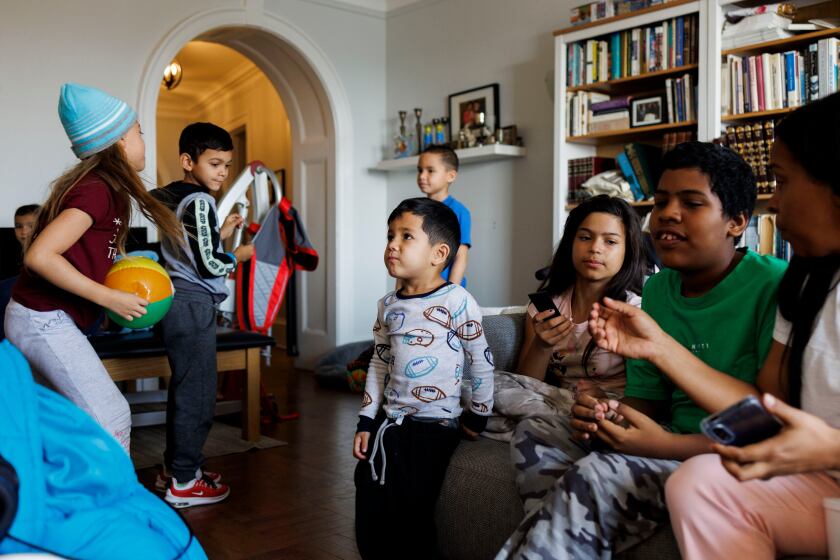
(Armando L. Sanchez/Chicago Tribune/TNS)
Home
Windows in Otts-Rubenstein’s living room let in abundant light, a dozen Australian finches chirp in a large cage in the corner and books in Hebrew line her shelves — a far cry from the 12th floor in the Inn of Chicago, where Perez said the rooms are cramped and dark and sometimes the cold from the outside gets in through the vents.
For the migrant families, Otts-Rubenstein’s living room has become a temporary refuge.
Otts-Rubenstein said she grew up with friends who were disabled, and she volunteered in high school at an after-school program for deaf and autistic kids. But she said she’s learned from the 200-plus hospitalizations she’s been through with her own daughter — mostly about patience and pace.
Six years ago, Otts-Rubenstein said she would not have invited the 12 families into her home. She would have been OK with “good enough.”
“It’s really about noticing what families need in order to take a breath,” she said.
Otts-Rubenstein said she makes so many decisions about Evelyn’s care plan that she cherishes the quiet moments in the day where she doesn’t have to make any decisions.
“For them, so many decisions are always made — what they’re eating, where they’re going, how they’re getting there, where they’re going to sit,” she said.
The mothers who came Saturday for the evaluation requested dry corn, mayonnaise and chicken so they could cook in Otts-Rubenstein’s kitchen. Migrants who use laundry services at the Inn sometimes lose their clothes, so some of them brought large bags of clothes to wash.
The endless Zoom meetings broke for lunch, and the women made arepas. They played Karol G songs through a speaker and danced. Otts-Rubenstein brought out Fanta and grape sodas.
Otts-Rubenstein sipped her coffee and said that the mothers had accidentally put Nescafé in the coffee machine.
“But it’s, like, perfect Nescafé,” she said, laughing.
Outcome
All of the children who attended the meeting at Otts-Rubenstein’s house were recommended for different CPS schools, but Otts-Rubenstein said she still had concerns. She said many of the schools might not have the support that they need. She notices things that the district might not, she said.
It will take a lot for the migrants — who have never left their children with others — to trust city officials to provide adequate care. She said it took a lot for her to trust the school where she now sends her daughter.
Otts-Rubenstein was especially disappointed by the district’s assessment of Keinymar and made a list of points the district missed: trauma care to help her cope with the stress of the long journey, visual impairment resources, technology to keep her engaged, direct nursing assistance and transportation.
“The fact that she doesn’t have a paraprofessional included on the bus, right? That’s a big problem and a big miss. Why did I catch that and the committee didn’t?” she asked.
She said Keinymar’s family shouldn’t accept the district’s academic goals for Keinymar without asking for additional staffing and support.
“We can revisit goals and make them more cued into Keinymar once she is able to attend school safely,” wrote Otts-Rubenstein in an email to the district.
Students with disabilities are protected under the Individuals with Disabilities Education Act, said Rachel Shapiro, managing attorney in the special education clinic at Equip for Equality. If parents don’t agree with the district’s designation for their child, she said, they can schedule a mediation to look at other types of accommodations.
“Special education students always have a right to go to school,” she said. “It’s important for parents to understand that, even if they’re not U.S. citizens, that their kids have these rights.”
A Full-Time Job
Some migrant families of children with disabilities have been at the Inn of Chicago for months. Otts-Rubenstein drives to the inn most days to check in with them.
The needs of these children extend beyond school, she said. Without her help, the children likely would have no one responding to their needs. Otts-Rubenstein said it has become almost a full-time job.
She hands out PediaSure from the back of her van, helps drive them to medical appointments and prints out documents. She even buys them cellphones with data so they don’t have to count on the unreliable Wi-Fi to fill out their health forms.
The city offered her a position as a shelter employee, but she said she can’t work the long shifts because she has to take care of her own daughter.
Emergency supplies and protocols for kids with disabilities aren’t always intuitive or front of mind for people working for the city, she said.

Trent Sprague/TNS
A Trial Run
On that recent Saturday, Otts-Rubenstein made a mental note that the next Zoom party she has with CPS will be better without everyone yelling into iPads in the same room.
She said this was a trial run. The education plans are just the beginning of the types of services she wants to provide for asylum-seekers with disabilities.
Meeting Keinymar and the kids at the inn has put Otts-Rubenstein’s life in a new direction.
“It’s really clarified for me that having care coordination for our kids by families of medically fragile kids, for families of medically fragile kids, is what I want to be doing,” she said.
The children she cares for are part of their family now, she said.
Every night, the messages pour in over WhatsApp: “Feliz noches, Señora Mary. Dios la bendiga. Good night, Señora Mary. God bless you.”
“We, as Chicagoans, can see these families as a burden that will stress our infrastructure or as wonderful friends and neighbors who give us opportunities to make sure that our systems meet everyone’s needs — especially the small and the disabled,” Otts-Rubenstein said.
As migrants entered her home Saturday, the Spanish speakers were unable to read the framed Shel Silverstein poem hanging on the wall:
“Listen to the mustn’ts, child./ Listen to the don’ts./ Listen to the shouldn’ts .... Then listen close to me …/ Anything can happen, child./ Anything can be.”
©2023 Chicago Tribune. Distributed by Tribune Content Agency, LLC.
Related Articles











